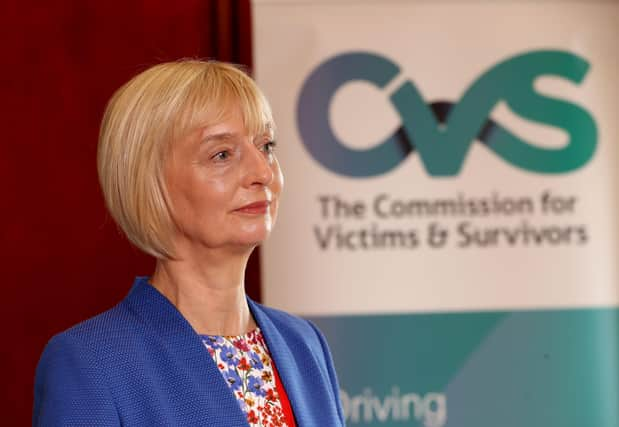Troubles pension must be paid now, says commissioner for victims


Judith Thompson made the call after a long campaign by victims for the support payments, which range from £2,000 to £10,000-a-year depending on the severity of the injury.
MPs passed legislation last year to establish the scheme which had been due to open to applications on May 29 but its future has been thrown into doubt over two separate disputes, one on funding, the other on eligibility.
Advertisement
Hide AdAdvertisement
Hide AdStormont and the Government are at odds over who foots the £100 million-plus bill.
Separately, Sinn Fein are blocking the appointment of a Stormont department to oversee the scheme, due to a stand-off with the Government over eligibility criteria which would require former convicted paramilitaries to go before an independent panel to determine whether they should get the payment.
Appearing at the Northern Ireland Affairs Committee on Wednesday, Ms Thompson said she accepts the “political decision” that people injured at their own hand should be excluded from a Troubles Pension.
She described the long running debate as around the issue as “unlikely to reach a helpful conclusion” adding it risked causing “hurt and disrespect”.
Advertisement
Hide AdAdvertisement
Hide AdMs Thompson said it “can’t be held up by a small number of people who may or may not get it”.
“It is simply not good enough and needs to be implemented immediately,” she said.
Ms Thompson also told the committee that investigations into Troubles incidents “should not be defined in terms of the number of prosecutions envisaged”.
“The critical issue for families is access to information about the circumstances leading to the death of someone they loved, and acknowledge of wrongness and harm,” she said.
Advertisement
Hide AdAdvertisement
Hide AdShe paid tribute to Operation Kenova led by former Bedfordshire chief constable Jon Boutcher as showing that new information and evidence can be uncovered and families who want answers “can be better served”.
“The Kenova investigation shows us that when families and stakeholders trust a legacy investigation as being independent and fair, they will provide evidence and information that can lead to cases being solved,” she said.
Ms Thompson added about current legacy proposals: “my concern is that victims and survivors across these islands may now be faced with legislation driven through Westminster that does little for them.
“Processes can only work if there is consultation, engagement and respect.
Advertisement
Hide AdAdvertisement
Hide Ad“It remains the commission’s view that legacy mechanisms as envisaged in the Stormont House Agreement remain the best opportunity to address the legacy of the past.”
Emmett McConomy, whose brother was killed by a plastic bullet, and Mary Moreland, whose husband was killed by the IRA, also gave evidence to the committees’ Legacy Inquiry.
Mr McConomy told the committee how his 11-year-old brother had been playing close to the house in 1982 in Londonderry when he was hit with a plastic bullet and later died in hospital.
He said that him and his family want answers but stressed it is “not a witch hunt”.
Advertisement
Hide AdAdvertisement
Hide Ad“The soldier who fired the plastic bullet gun did so from inside an army Saracen.
“There was no riot at the time, the soldiers were not under any threat and yet Stephen lost his life,” he said.
“So the genuine questions that my family has always asked is why, what risk was Stephen posing, why was he shot.
“I have campaigned for the last 10 to 15 years to find answers and have been met with blocks and blocks and delays.
Advertisement
Hide AdAdvertisement
Hide Ad“Those delays our family has experienced, many others have experienced as well, and I say that too for the mothers and brothers of all victims, whether they be police, army or civilians.
“People have a right to know what happened to their loved ones.”
Ms Moreland from Co Down, told the committee of how the IRA killed her husband John who was a part time soldier in the Ulster Defence Regiment in 1988.
“The Troubles have impacted on all of us, either directly or indirectly, and not just Northern Ireland but throughout the United Kingdom as a while and even beyond the United Kingdom and therefore I feel it will take society as a whole to fix it.
Advertisement
Hide AdAdvertisement
Hide Ad“But that starts with government listening and putting victims and survivors at the very centre of everything they do.
“I believe, as Emmett as said, we can’t kick the can down the road any longer, we need action now.
“The status quo isn’t working so we need to recognise there was injustices in the past and we need to start to build a society that belongs to all that live in it, everyone.”